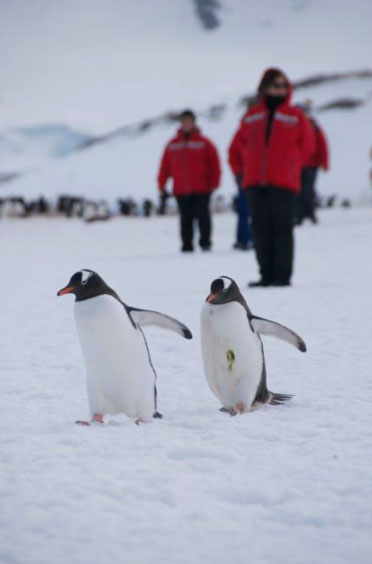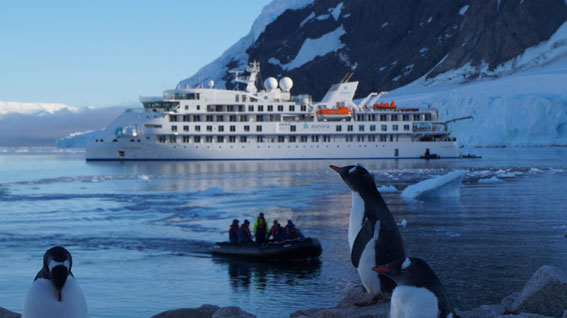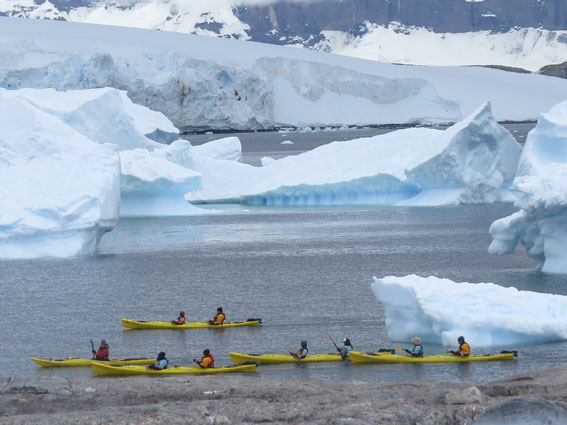 Tourism is a key avenue for humans to visit Antarctica. Potential environmental impacts and the effective management of tourism are relevant for academics, policy-makers, media, and the public. The Tourism Action Group (Ant-TAG) harnesses the range of expertise in SC-HASS and related Standing Committees on tourism topics, serving as a platform for researchers from different disciplinary perspectives to work together collaboratively and make evidence-based recommendations. The Ant-TAG will also connect active tourism researchers with the wider Antarctic science and practitioner communities, enriching the expertise and its synergies in this area.
Tourism is a key avenue for humans to visit Antarctica. Potential environmental impacts and the effective management of tourism are relevant for academics, policy-makers, media, and the public. The Tourism Action Group (Ant-TAG) harnesses the range of expertise in SC-HASS and related Standing Committees on tourism topics, serving as a platform for researchers from different disciplinary perspectives to work together collaboratively and make evidence-based recommendations. The Ant-TAG will also connect active tourism researchers with the wider Antarctic science and practitioner communities, enriching the expertise and its synergies in this area.
Antarctic Tourism Action Group (Ant-TAG)
About
 Tourism is an important activity in the Antarctic region, bringing up to 74,000 people south each year (pre-COVID19). Polar tourism is a significant area of research across the humanities and social sciences and has relevance for related disciplines such as ecological and environmental sciences. To date, much of the policy-ready advice around tourism has been provided by the industry, through bodies such as the International Association of Antarctica Tour Operators (IAATO). There is a salient gap when it comes to unbiased, peer-reviewed scholarly advice.
Tourism is an important activity in the Antarctic region, bringing up to 74,000 people south each year (pre-COVID19). Polar tourism is a significant area of research across the humanities and social sciences and has relevance for related disciplines such as ecological and environmental sciences. To date, much of the policy-ready advice around tourism has been provided by the industry, through bodies such as the International Association of Antarctica Tour Operators (IAATO). There is a salient gap when it comes to unbiased, peer-reviewed scholarly advice.
 Ant-TAG provides an umbrella under which researchers and practitioners can make new connections, become aware of other existing projects, and pool existing expertise in order to make the most accurate and up-to-date recommendations relating to the practice of tourism in the region. The coronavirus pandemic makes this work more urgent than ever as the industry faces significant changes. Policy and regulatory bodies within the ATS will require unbiased advice on the challenges ahead for the tourism activities and operations in Antarctica, as new stakeholders (and practices) will likely emerge post-pandemic. By exploring future scenarios for Antarctic tourism and analysing the impacts on a range of stakeholders, Ant-TAG will makes timely contributions to policy discourse and the future management of the Antarctic Tourism industry.
Ant-TAG provides an umbrella under which researchers and practitioners can make new connections, become aware of other existing projects, and pool existing expertise in order to make the most accurate and up-to-date recommendations relating to the practice of tourism in the region. The coronavirus pandemic makes this work more urgent than ever as the industry faces significant changes. Policy and regulatory bodies within the ATS will require unbiased advice on the challenges ahead for the tourism activities and operations in Antarctica, as new stakeholders (and practices) will likely emerge post-pandemic. By exploring future scenarios for Antarctic tourism and analysing the impacts on a range of stakeholders, Ant-TAG will makes timely contributions to policy discourse and the future management of the Antarctic Tourism industry.
Key aims of the group are to:
- Integrate, prioritize, and implement research agendas derived from the two precursor projects (AC21 and SCAR COVID-19 project) and critical research needs raised by other scholars with regards to Antarctic tourism research, research that intersects with tourism, and tourism in the post-COVID-19 world;
- Facilitate research collaboration among Ant-TAG members and other relevant SCAR groups in order to create policy-ready advice for SC-ATS and the Antarctic Environments Portal;
- Establish a communication platform with IAATO and other stakeholders for translating research into management recommendations and addressing industry-relevant knowledge gaps; and
- Collate research-based policy-ready information on the topic of Antarctic tourism for SC-ATS to present to the ATCM and CEP.
If you would like to be added to the group’s mailing list, please complete the online registration form.
Members
Contact
To contact the Ant-TAG team, please email the Ant-TAG leadership or tweet us at @AntarcticTouri1.
If you would like to be added to the group’s mailing list, please complete the online registration form.
| Name |
Affiliation | Country |
| Hanne Nielsen | University of Tasmania | Australia |
| Daniela Cajiao | Universidad Autónoma de Madrid |
Spain |
| Yu-Fai Leung | North Carolina State University | USA |
| Gabriela Roldan | University of Canterbury / New Zealand Antarctic Heritage Trust | New Zealand |
News
News and Updates from the Antarctic tourism research community.
Ant-TAG|
Publication: Is COVID-19 helping or hindering effective management of Antarctic tourism?
A new article looking at the impact of Covid-19 on …
Ant-TAG|
Participating in Ant-TAG
If you are a researcher working on Antarctic tourism …
Ant-TAG|
Antarctic Tourism Action Group invites input from the SCAR community
The SC-HASS Tourism Action Group (Ant-TAG) was approved at the …
Resources
Publications and Links of interest to the Antarctic tourism research community.
Travel, Tourism and Antarctic Identity – a session from the 2021 SC-HASS Conference:
